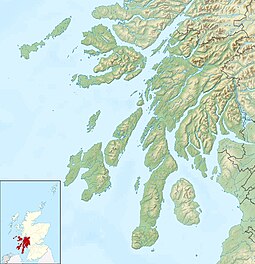Eorsa
| Meaning of name | uncertain "Jorulof-øy" - Jorulf's island or from "àrsaidh" - ancient |
|---|---|
| Location | |
|
Eorsa shown within Argyll and Bute
|
|
| OS grid reference | NM481378 |
| Coordinates | 56°28′N 6°05′W / 56.47°N 6.08°W |
| Physical geography | |
| Island group | Mull |
| Area | 122 ha (0.47 sq mi) |
| Area rank | 136= |
| Highest elevation | 98 m (322 ft) |
| Administration | |
| Sovereign state | United Kingdom |
| Country | Scotland |
| Council area | Argyll and Bute |
| Demographics | |
| Population | 0 |
| References | |
Eorsa is an uninhabited island in the Inner Hebrides of Scotland.
Eorsa lies in Loch na Keal on the west coast of the Isle of Mull, to the east of Ulva. It is part of the Loch Na Keal National Scenic Area, one of 40 in Scotland.
Many of the nearby islands, including Inchkenneth, have early ecclesiastical connections. Eorsa may have done too. It once belonged to the Abbey of Iona, and became the property of the Duke of Argyll.
During World War I, the island was used as a British naval anchorage.
The island is the fictional setting of Nigel Tranter's 1952 novel Bridal Path, which was made into film of the same name in 1959. As the comic novel takes the perils of island inbreeding as its theme, it is assumed that Tranter deliberately chose an unpopulated island to avoid giving offence.
Eorsa is separated from Mull by nearly a mile of water at the closest point so there are very few land animals. Locals on Mull joke that the island is "heaving with adders" although this may not be entirely true. Red deer are good swimmers and could easily make the crossing if they wanted to. It's simply a question of whether there is anything the deer want there which can't be found on the mainland.
Coordinates: 56°28′N 6°5.3′W / 56.467°N 6.0883°W
...
Wikipedia

